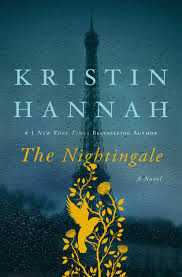A daily journal of our lives (begun in October 2010), in photos (many taken by my wife, Evie) and words, mostly from our home on Chautauqua Lake, in Western New York, where my wife Evie and I live, after my having retired from teaching English for forty-five years in Hawaii, Turkey, and Ohio. We have three children, seven grandchildren, and two great-grandsons, as you will notice if you follow my blog, since we often travel to visit them. : Morning Paddle, 12/06/25 at 8:47 AM
Thursday, October 29, 2015
THE NIGHTINGALE: KRISTIN HANNAH
Another book set during WW II, not in Berlin this time but in occupied France. And the protagonists are not guys but women. At first, I wondered why I was reading this book; I knew it would not be much fun. How could the Nazi occupation and their often abominable behavior be fun. It couldn't but the behavior of the French Underground, the understandable fears of the French people, and the heroic actions of the two main protagonists, two sisters, Vianne and Isabelle Maurica, make the book unforgettable. Both have terrible childhoods, having lost their mother when they were young and abandoned by their father after their mother's death. Their father, having lived through the atrocities of WWI, comes home psychologically harmed, a different person, and the death of his wife literally took away his will to live and he left his children to a stern mistress.
They are scarred by his abandonment, but Vianne falls in love at 16, marries at 17 and has a seemingly good life. For Isabelle, however, the opposite is true and she is expelled from one boarding school after another, for unruly behavior and breaking the rules. Neither sister has much sympathy for the other since they have not lived together since their mother's death.
The novel begins with the coming of the Nazis, the falling of the Maginot Line, which would supposedly protect the French, but the French quickly surrender to the German army. The rest of the novel describes their lives during the occupation, seen partly through the eyes of Vianne, as life, freedom, and food slowly disappear each year. Her husband, Antoine, has been captured and is working as slave labor. Vianne must feed her two children, then her Jewish neighbor Rachel's son, when she is taken away to the camps. Like many women, she is forced to house a Gestapo officer, Captain Beck, a surprisingly kind, empathetic officer, who does his best to help her family. When he is killed, by Vianne by the way, to save her children, another officer moves in, SS Herr Sturmbannfuhrer, a pig, who despises the French, rapes Vianne, makes her pregnant, and could care less about her children. That's Vianne's half of the story.
The other half chronicles her rebellious sister, Isabelle, who refuses to kowtow to the Nazis and leaves Vianee behind because her attitude toward the Germans would jeopardize Vianee and her children. She joins the French Underground and slowly earns her wings by first finding downed British and American airmen, then taking them on a dangerous trek over the Pyrenees to the British or American consulate in Spain, saving their lives. Every trek is dangerous, risking both her and the air men's lives, and she becomes an anathema to the Nazis, is nicknamed The Nightingale, and they do everything they can to capture her. She makes over twenty-seven trips during the last three years of the war before she is finally captured and tortured though they cannot get her to admit who the Nightingale is (they have no idea it's a woman), and she is finally sent to a camp. She barely survives but returns home to her sister Vianne and dies shortly after.
The saddest part of the novel is when Daniel, Vianne's Jewish friend Rachel's son, who has become just like her son, is taken away from her after the war by the Jewish Refugee Organization, and he is repatriated to a family in the States. This seems almost as terrible as what she endured during the Nazi occupation.
The novel is told in retrospect by an older woman; we are not sure who she is until the end. It's Vianne who has never told her children about her life before coming to the States. In her 70's, however, dying of cancer, she agrees to go to France to accept an award for saving the lives of many Jewish children and it's only then that her son learns about her heroic actions. What he never learns is that he was fathered by the Nazi who was housed in Vianne's home. Love conquerors all.
Subscribe to:
Post Comments (Atom)

No comments:
Post a Comment